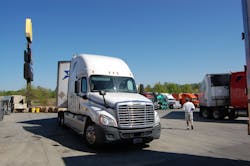Despite increasingly tighter truck capacity of late, many carriers believe they are still not earning a decent enough rate of return in the freight business to expand their fleets.
Indeed, many experts project that capacity should continue to get tighter as still-sluggish cargo volumes combined with higher operating and equipment costs will convince carriers to keep expansion efforts on the back burner for the foreseeable future.
“Higher equipment costs in recent years, combined with the lower utilization resulting from new HOS rules, will continue to make adequate returns on investment a challenge,” noted Steven Dutro, a partner with consulting firm Transport Capital Partners (TCP), pointing a recent survey by the firm that found only 50% of carriers believe they are getting the rates of return needed to justify further investment in new equipment – and increase of just four percentage points from November last year.
John Larkin, head of transportation capital markets research for Stifel, Nicolaus & Co., said in a recent research update that with flattish/modestly growing freight demand and stable truck supply, the truckload industry seems to appear to be within striking distance of a capacity shortfall.
However, in order for the current environment to improve to the point where carriers can secure more significant rate increases in the mid-single digits and upward, he believes the industry needs one or more of the following factors:
- Increased demand due to pent up demand created by the elongated winter season this year, with continued recovery in the auto and housing sectors, or strength in manufacturing related to an increase in personal consumption;
- Reduced supply related to fleet shrinkage or the implementation of federal rules and regulations that either reduce the size of the driver pool or reduce the upper limit on driver productivity.
“Only then will rate increases outstrip the rate of cost increases, especially for large, purchasing-advantaged truckload carriers,” Larkin cautioned.
Yet Noel Perry – senior consultant with FTR Associates and principal of research firm Transport Fundamentals – thinks the necessary environment for achieving significant rate increases hasn’t developed as of yet.
In comments given during FTR’s “State of Freight” webinar last week, Perry noted that the truck shortage dropped from near 200,000 units in the third quarter of 2010 to closer to 50,000 units in the second quarter of this year, but still considered that “a very modest number” in his view.
“The economy itself is only going to [place] modest pressure on the truck shortage,” he added. “Truck volumes [should] grow on average slightly below GDP [gross domestic product] the rest of this upturn [but] since the first quarter of 2011, GDP has bounced up and down so it’s a little bit difficult to get a read on it.”
TCP Partner Richard Mikes pointed out that such uneven economic activity may be a major reason carriers are still not seeing adequate rates of return, nor any relief in their ability to renegotiate accessorial charges.
“With many reporting inadequate rates of return, it is understandable that one-third of all carriers do not intend to add new equipment,” he said. “Replacement of aging fleets remains the primary driver of equipment purchases.”
Indeed, Stifel’s Larkin noted that large carriers are holding the line on fleet size as they continue their normal replacement cycles, growing, if at all, in what he called “asset-lighter” spaces such as intermodal and brokerage operations.
He emphasized that small carriers continue to shrink as they struggle with securing financing to refresh their aging fleets – spending too much on maintenance and giving away too much revenue away to brokers – while selected mid-sized carriers seem to be the ones adding capacity to their fleets as they worry that they will not be considered large enough by many shippers to make the shipper’s core carrier list.
Meanwhile, TCP’s survey reported that while 73% of carriers expect rates to rise over the next 12 months, 45% of them still do not believe they will be able to renegotiate accessorial charges. That being said, 43% do believe they will be able to address detention time charges due to the recent changes made to hours of service (HOS) rules.
Still, while carriers across the board expect rate increases in the next 12 months, larger carriers are significantly more confident than smaller carriers that they will be able to raise accessorial charges as 64% of smaller carriers in TCP’s poll said they see no relief in accessorial charge negotiations.
In contrast, only 37% of larger carriers do not believe they will be able to renegotiate accessorial charges.
“As freight demand grows shippers who need consistent service will need to assist carriers in gaining operational efficiency and adequate compensation,” Mikes said. “Larger carriers are more confident they are positioned to achieve this customer cooperation.”
About the Author
Sean Kilcarr
Editor in Chief
Sean Kilcarr is a former longtime FleetOwner senior editor who wrote for the publication from 2000 to 2018. He served as editor-in-chief from 2017 to 2018.
